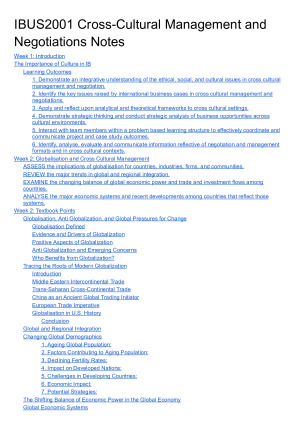IBUS2001 Notes Week 1-4
Subject notes for Newcastle IBUS2001
Description
Week 1: Introduction The Importance of Culture in IB Learning Outcomes 1. Demonstrate an integrative understanding of the ethical, social, and cultural issues in cross cultural management and negotiation. 2. Identify the key issues raised by international business cases in cross cultural management and negotiations. 3. Apply and reflect upon analytical and theoretical frameworks to cross cultural settings. 4. Demonstrate strategic thinking and conduct strategic analysis of business opportunities across cultural environments. 5. Interact with team members within a problem based learning structure to effectively coordinate and communicate project and case study outcomes. 6. Identify, analyse, evaluate and communicate information reflective of negotiation and management formats and in cross cultural contexts. Week 2: Globalisation and Cross Cultural Management ASSESS the implications of globalisation for countries, industries, firms, and communities. REVIEW the major trends in global and regional integration. EXAMINE the changing balance of global economic power and trade and investment flows among countries. ANALYSE the major economic systems and recent developments among countries that reflect those systems. Week 2: Textbook Points Globalisation, Anti Globalization, and Global Pressures for Change Globalisation Defined Evidence and Drivers of Globalization Positive Aspects of Globalization Anti Globalization and Emerging Concerns Who Benefits from Globalization? Tracing the Roots of Modern Globalization Introduction Middle Eastern Intercontinental Trade Trans-Saharan Cross-Continental Trade China as an Ancient Global Trading Initiator European Trade Imperative Globalisation in History Conclusion Global and Regional Integration Changing Global Demographics 1. Ageing Global Population: 2. Factors Contributing to Aging Population: 3. Declining Fertility Rates: 4. Impact on Developed Nations: 5. Challenges in Developing Countries: 6. Economic Impact: 7. Potential Strategies: The Shifting Balance of Economic Power in the Global Economy Global Economic Systems 1. Types of Economic Systems: 2. Market Economy: 3. Command Economy: 4. Mixed Economy: Economic Performance and Issues of Major Regions Emerging and Developing Economies Central and Eastern Europe China Other Emerging Markets of Asia India Developing Economies on the Verge Introduction South America Middle East and Central Asia Africa The World of International Management—Revisited Pros and Cons of Globalization and Free Trade Pros: Cons: The Rise of Social Media and International Relations Closer Connections: Fewer Conflicts: Regions Benefiting from Globalization and Integration Likely to Benefit: Potential Dislocations or Setbacks: SUMMARY OF KEY POINTS Week 3: Understanding Dimensions and Theories of Culture 1. Define the term culture and discuss some of the comparative ways of differentiating cultures. 2. Describe the concept of cultural values, and relate some of the international differences, similarities, and changes occurring in terms of both work and managerial values. 3. Identify the major dimensions of culture relevant to work settings through Hofstede’s cultural model. 4. Discuss the first assignment-group case study report. Textbook Chapter 4: THE MEANINGS AND DIMENSIONS OF CULTURE The World of International Management: Culture Clashes in Cross-Border Mergers and Acquisitions Case Study: Takeda Pharmaceutical and Shire Plc Challenges in Cross-Border Mergers and Acquisitions Case Study: Du Pont and Danisco Case Study: Daimler-Chrysler Merger Case Study: ABInBev’s Purchase of SABMiller Key Takeaways and Future Strategies Conclusion The Nature of Culture Definition and Characteristics of Culture Importance in International Management Cultural Diversity Cultural Impact on Management Models of Culture Values in Culture Values in Transition Cultural Dimensions Hofstede’s Dimensions GLOBE Study Integrating the Dimensions Culture and Management: Insights from the GLOBE Project GLOBE’s Nine Cultural Dimensions GLOBE Country Analysis World of International Management—Revisited Summary of Key Points Week 4: Managing Across Countries The World of International Management: Apple vs. Xiaomi Overview of Companies Corporate Culture Supply Chain Management Product Focus Intellectual Property Looking Forward The Strategy for Managing Across Cultures Cultural Strategies in Multinational Corporations (MNCs) Strategic Predispositions in MNCs Orientation of an MNC Challenges in Global Strategy Implementation Globalisation vs. National Responsiveness Key Insights for International Strategy Development Cross-Cultural Differences and Similarities Challenges for Multinational Corporations (MNCs) Parochialism and Simplification Six Basic Cultural Variations Cultural Contexts: High vs. Low Cultural Similarities Cultural Differences in HRM Practices Cultural Clusters and Compensation Strategies Hybrid HRM Practices Changing Cultural Norms Using the GLOBE Project to Compare Managerial Differences Increasing International Leadership Roles Managing Culture in Specific Countries and Regions 1. Aspects of Apple’s Culture 2. Aspects of Xiaomi’s Culture 3. Strategic Predispositions 4. Learning Opportunities
Newcastle
Semester 2, 2024
18 pages
11,581 words
$29.00
Campus
Newcastle, Newcastle City
Member since
March 2025
